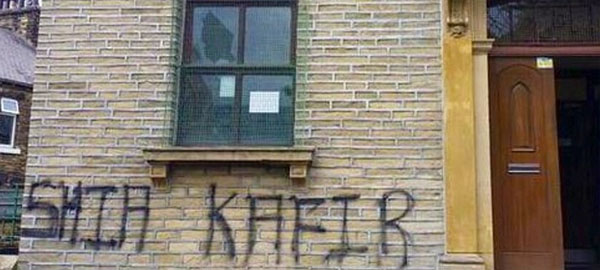A graffiti attack on a Shia mosque in Bradford is one of the first visible examples of sectarian tension in Britain’s Muslim communities.
Users of the Hussania Islamic Centre arrived at the building one morning in June to find that someone had written in spray paint on the wall: “Shia Kafir”.
The graffiti — suggesting that minority Shia Muslims were “unbelievers” — was reported to West Yorkshire police as a potential hate crime. A 14-year-old boy has been arrested and granted bail.
The number of crimes revealing Sunni-Shia tensions remains small but all types of “hate crime” are notoriously under-reported. There is growing evidence of religious sectarianism in incidents of intimidation.
Tell Mama, an organisation that measures anti-Muslim attacks, said that it had been made aware of a campaign against Shia Muslims in the Leeds-Bradford area. A leaflet entitled Shiaism — a religion outside Islam was distributed to schools and businesses, and text and social network messages were circulated, urging the recipients to shun Shia food sellers. “Please avoid eating at these 2 shia takeaway in Bradford,” one message said. “Both are owned by shias who are supporters of Hezbollah and Bashar Assad [Syria’s Shia president], do not give support to those who are killing Sunni Muslims in Syria.”
Fiyaz Mughal, Tell Mama’s director, said he believed the propaganda circulating on the internet from the conflict in Syria and the wider Saudi-Iran power struggle would lead to more violent incidents in Britain.
“Levels of hate crime remain low,” he said. “We’ve had reports of five anti-Shia incidents this year and only two last year but remember a lot of what goes on does not reach us.”
The most high-profile incident of sectarian violence occurred in 2013 when a group of al-Muhajiroun supporters marched on Edgware Road in London carrying anti-Shia and pro-Islamic State banners. Some of the ten men convicted in connection with the incident were heard shouting: “Shias are the enemy within.”
The divisions are increasingly reflected on university campuses where Sunnis run Islamic societies and Shia students set up their own societies.
Omar Farooq, who heads the Bradford University branch of the Shia group, said: “The hostility felt by Shia students from the Islamic Society, which is heavily influenced by hardline Saudi doctrines, has been evident over the years. Students have been dismissed from posts because they are Shia. Some sisters have been bullied.”
Superintendent Paul Giannasi, who leads the programme on hate crime, said: “The police consider hate crimes to be a priority because they cause greater harm to the individual and to communities and they undermine the core values of our society.”
By Faisal Hanif, Sean O’Neill at The Times UK

